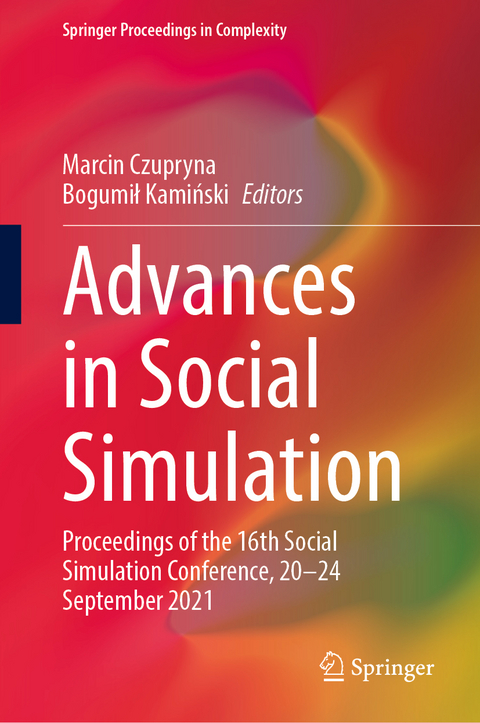
Advances in Social Simulation
Springer International Publishing (Verlag)
978-3-030-92842-1 (ISBN)
This book covers the latest advances in applying agent-based modelling in social sciences. The Social Simulation Conference is the major global conference devoted to this topic. It is aimed at promoting social simulation and computational social science.
This year's special theme is "Social Simulation geared towards Post-Pandemic times", focused not only on questions raised by the current pandemic but also on future challenges related to economic recovery, such as localization, globalization, inequality, sustainable growth and social changes induced by progressive digitalization, data availability and artificial intelligence.
The primary audience of this book are scholars and practitioners in computational social sciences including economics, business, sociology, politics, psychology and urban studies.
lt;p>Marcin Czupyrina is Associate Professor in the Financial Markets Department of Cracow University of Economics, Poland. He holds a Ph.D. in Quantitative Methods in Economics from the Warsaw School of Economics. He obtained a Marie Curie Scholarship in 2004 (Centre for operations research and econometrics, Université catholique de Louvain, Louvain-la-Neuve, Belgium).
His research concentrates on decisions under risk and uncertainty, behavioural aspects of decision process with the application to the financial markets as well as on microstructural aspects of the markets.
Bogumil Kaminski is Associate Professor at SGH Warsaw School of Economics, Poland and Adjunct Professor at Ryerson University, Canada. His research fields are computational social science and operations research. He is an expert in design and analysis of simulation experiments and high-performance computing using the Julia language.
Efficient Redistribution of Scarce Resources Favours Hierarchies.- Evaluation of COVID-19 Infection Prevention Measures Compatible with Local Economy.- DIPP: Di usion of Privacy Preferences in Online Social Networks.- Explaining and Resolving Norm-behavior Inconsistencies - A Theoretical Agent-based Model.- Towards More Realism in Pedestrian Behaviour Models First Steps and Considerations in Formalising Social Identity.- Developing a Stakeholder-centric Simulation Tool to Support Integrated Mobility Planning.- Support Local Empowerment Using Various Modeling Approaches and Model Purposes: a Practical and Theoretical Point of View.- Exploring Coevolutionary Dynamics Between Infinitely Diverse Heterogenous Adaptive Automated Trading Agents.- Pay-for-Performance and Emerging Search Behavior: When Exploration Serves to Reduce Alterations.- E ects of Limited and Heterogeneous Memory in Hidden-action Situations.- Autonomous Group Formation of Heterogeneous Agents in Complex Task Environments.- Exploring Regional Agglomeration Dynamics in Face of Climate-driven Hazards: Insights from an Agent-based Computational Economic Model.- Dynamics of Wealth Inequality in Simple Artificial Societies.- Cruising Drivers' Response to Changes in Parking Prices in a Serious Game.- Quantum Leaper : A Methodology Journey From a Model in NetLogo to a Game in Unity.- How Perceived Complexity Impacts on Comfort Zones in Social Decision Contexts - Combining Gamification and Simulation for Assessment.- A Hybrid Agent-based Model to Simulate and Re-think Post-COVID-19 Use Processes in Educational Facilities.- Generation Gaps: An Agent-Based Model of Opinion Shifts among Cohorts.- Comparison of Viral Information Spreading Strategies in Social Media.- An Evidence-Driven Model of Voting and Party Competition.- Shrinking Housing'sSize Using Agent-based Modelling to Explore Measures for a Reduction of Floor Area per Capita.- The Problem with Bullying: Lessons Learnedfrom Modelling Marginalization with Diverse Stakeholders.- On the Impact of Misvaluation on Bilateral Trading.- Consumer Participation in Demand Response Programs:Development of a Consumat-based Toy Model.- Using MBTI Agents to Simulate Human Behaviorin a Work Context.
| Erscheinungsdatum | 31.03.2022 |
|---|---|
| Reihe/Serie | Springer Proceedings in Complexity |
| Zusatzinfo | XVI, 470 p. 112 illus., 62 illus. in color. |
| Verlagsort | Cham |
| Sprache | englisch |
| Maße | 155 x 235 mm |
| Gewicht | 889 g |
| Themenwelt | Mathematik / Informatik ► Informatik ► Theorie / Studium |
| Naturwissenschaften ► Physik / Astronomie ► Theoretische Physik | |
| Naturwissenschaften ► Physik / Astronomie ► Thermodynamik | |
| Schlagworte | agent-based modelling • Computational Social Sciences • conference proceedings • Mathematical Modellling • Social Networks • social simulation |
| ISBN-10 | 3-030-92842-X / 303092842X |
| ISBN-13 | 978-3-030-92842-1 / 9783030928421 |
| Zustand | Neuware |
| Haben Sie eine Frage zum Produkt? |
aus dem Bereich


